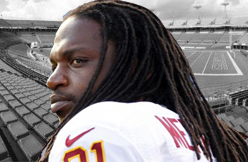Filter out the noise. It is tough to do. Brandon Meriweather calling out Brandon Marshall is sexy. It was an incendiary -- and unnecessary -- slap. It was player-on-player crime. That sells.
But listen to exactly what Meriweather said Monday about how he is going to change the way he plays the safety position for Washington. It, too, was bold. It was honest. It was real.
And it is a problem for the National Football League, because Meriweather certainly isn't alone. He simply was unafraid to put his name and his voice to a subject that has been brewing for years.
Meriweather is going to start targeting opposing players' lower legs. That's right. He said he is going to target knees. He is going to try to tear ACLs. Because he has a history of hitting opponents too high -- he just served a one-game suspension for two hits he made against Chicago on Oct. 20 -- Meriweather vowed to no longer aim high. He is going to aim low, the consequences be damned.
"I guess I just have to take people's knees out," Meriweather said. "That's the only way. I would hate to end a guy's career over a rule, but I guess it's better other people than me getting suspended for longer. You just have to go low now, man. You've got to end people's careers. You got to tear people's ACLs and mess up people's knees. You can't hit them high anymore."
No, you can't. That much the NFL has made clear. You can't hit high. You can't target the head. You can't lead with the crown of your helmet. You can't hit a defenseless receiver.
The price for doing those things ranges from a 15-yard penalty to a suspension, which carries with it the loss of a game check. That is severe, but that is how much the NFL is trying to take the head out of the game. The league should be applauded for that.
If Meriweather is any indication -- and he should be, given that he just had to sit on the couch and watch Washington lose to Denver on Sunday rather than help his teammates defend Peyton Manning -- the message has been received.
Yet there is an unintended consequence for altering the strike zone. There will be other injuries. Different injuries. Not crippling head injuries, but potentially career-threatening injuries. Knee injuries.
That's not good, either. That will have its own set of ramifications.
So far since the regular-season started, at least 54 players have gone on injured reserve with lower leg injuries. There are plenty of big names on the list: St. Louis quarterback Sam Bradford, Indianapolis wide receiver Reggie Wayne, Houston linebacker Brian Cushing, Atlanta wide receiver Julio Jones, New England nose tackle Vince Wilfork, Denver left tackle Ryan Clady and Pittsburgh center Maurkice Pouncey, among others.
It hurts the game when stars go on the shelf for a season. If defensive players now intentionally shoot low -- which is what some will inevitably do to avoid fines and suspensions for hitting too high -- more injuries will follow, which will dilute the product.
Just imagine if offensive players think defensive players are intentionally trying to hurt them by aiming for the knees. A blow to the knee could be a career ender. It could potentially cost a player hundreds of thousands if not millions of dollars.
That would not go over well. That could be beyond ugly.
And that could definitely happen.
The measured response to Meriweather's newfound approach is to tell him to just aim for the middle. Attack an opponent's core. Try to wrap him up around his middle. Rely on technique.
But even Washington coach Mike Shanahan said that if a player is going to err on the side of caution, "you would rather go low than you would high."
The reality is that in a collision sport where things happen at accelerated speeds between players who are bigger, stronger and faster than they were 10 years ago, knees are going to be in play. Nutrition and training have evolved. The game has changed and continues to change. Lower leg injuries are going to be a consequence.
Defensive players are frustrated by all of the rules changes they think benefit the offense. They are frustrated by all of the flags and all of the fines. They think the league has tilted the landscape to favor offenses, because prolific offenses are more exciting to the ticket-buying public than stingy defenses.
Meriweather just voiced that frustration. He was wrong, but he was real.
The next step in this evolution will be for the NFL's competition committee to act, and surely it will. Every offseason, the committee studies injuries. This spring will be no different. If defensive players intentionally target lower legs, the committee will legislate a new rule, because the game can't have a rash of torn ACLs and blown Achilles tendons.
That wouldn't be good for anybody, Brandon Meriweather included.

(espn.com)



